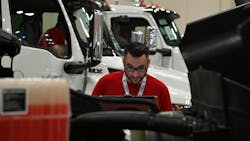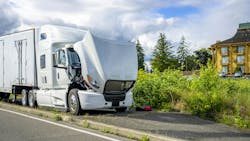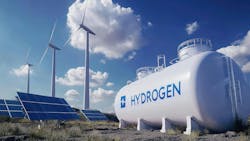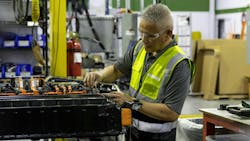The commercial vehicle industry has experienced many ups and downs since I entered it in 2022, from rising expenses for fleets and shops alike to decreasing freight and a pernicious technician shortage. But I’ve also seen a lot of resilience and ingenuity at every level of the industry, from individual technicians to large companies working to solve these issues in creative ways.
For examples of both that determination and innovation, here’s a couple stories from the past year that made me feel hopeful about where the transportation and maintenance sectors could go in 2024.
American dream alive and thriving for Mexican-born mobile repair owner
A lot of getting a new business to become successful is about providing services lacking in a market. Mexican native Pedro Lara honed his skills while working for Cummins—and the San Diego area did need more mobile maintenance providers. The problem was getting across the border and raising the start-up cash. After months of savings—and even donating blood and selling baked goods in the early days—he and his wife Stephanie were able to get their own service trucks and now have a flourishing business raising uptime in the city. You stay classy, Pedro!
In the race to find and fund zero-emissions powertrains, hydrogen fuel cells have a lot of advantages going for them, including faster refuel times and longer ranges. But they have their own problems, too, including the fact that transporting this fuel can be both difficult and costly, not to mention the ironic fact that the most common way to produce hydrogen right now creates CO2 emissions in the process.
According to Ole Hoefelmann, president of Nikola Energy, the fueling arm of Nikola Corp., the way the hydrogen ecosystem is today, “anybody who produces hydrogen usually extracts all the value, and whoever dispenses the hydrogen loses all the money to build the market. And that's not sustainable.”
So, are there any other options for hydrogen as a fuel source? And if so, how viable is it for the transportation industry? In this case, White Hydrogen presents a way forward, if startups like PureWave Corp. can create a reliable way to locate it.
The transportation industry is full of stories, from the drivers who used to ride alongside their grandfathers to technicians who have used their trade to make a better life for their families. Even a humble truck stop can have a colorful history behind it, as was the case with Johnson’s Corner, which has become a local landmark in Northern Colorado.
The original Johnsons established the location before Interstate 25 was even laid and went on to host everyone from truck drivers to the FBI. Even after Johnson’s Corner was no longer a family business, it retains its down-home charm, undoubtedly helped by their famous cinnamon rolls.
In WrenchWay’s most recent Voice of the Technician survey, communication was one of the lowest-ranked categories, with only 34% of respondents saying that their shop management communicates well. And what’s equally dispiriting is that 2024’s results are 13% lower than 2023’s.
“I would have hoped we made some improvements, but it's red all over the board…so that's a little scary,” said Matt Shepanek, VP of credential testing programs for ASE and a former tech with several years working as an OE technical trainer. “Some of it is such low-hanging fruit—things like communication. These aren't really difficult things to implement as a manager in the shop. Get your team together and talk to them.”
To reverse this trend, here’s some advice for fleet professionals to up their communication game, from the shop floor to the C-suite.
Cox drills into EV battery maintenance, life cycles at OKC site
Electric vehicle batteries present challenges to the transportation industry for various reasons, not only from their weight and the potential danger in servicing them, but in what fleets can do once their batteries have reached the end of the lifecycle. This is where companies like EV Battery Solutions by Cox Automotive come in, and not only for a battery’s end, but every stage of its life.
“In this rush to production and adoption, once that vehicle is out in the wild, how it’s going to be taken care of, what happens when an unexpected failure occurs in the battery pack, is something we've specialized in,” said Lea Malloy, AVP of EV Battery Solutions by Cox Automotive.
The company’s EV Battery Solutions facility offers a look into what it takes to troubleshoot, repair, and eventually, recycle these critical components, while also offering a look at what the industry may need to consider should electric vehicles become widely viable.
Looking forward
While I’ve been covering commercial vehicle maintenance, I’m often struck by the discrepency between technicians’ passion for the work they do and their deep dissatisfaction for how and where they do that work. For instance, in WrenchWay’s 2025 Voice of the Technician Report, under half of diesel technicians said that they felt valued and respected by management, and 58% of auto and diesel technicians said they feel fairly compensated.
“The bottom line is, I don’t hate what I do, but there are better ways to make a living,” said Brandon Harmatiuk, sr. master technician at Subaru on LinkedIn. “The amount of effort it takes to become an elite technician applied to a different career could probably get you more freedom and better comp. If I had put the energy that I have put into this into, say, business ownership, real estate, or creative production, I truly think I could be work-optional at this point in my life.”
I want to dig in to how to make sure technicians feel they are valued in the shop, whether through better pay or increased training, so that the industry can turn numbers like these around in the new year. If you think you can help provide any information or thoughts for this story, or have another topic I should cover, email me at [email protected].
About the Author

Alex Keenan
Alex Keenan is an Associate Editor for Fleet Maintenance magazine. She has written on a variety of topics for the past several years and recently joined the transportation industry, reviewing content covering technician challenges and breaking industry news. She holds a bachelor's degree in English from Colorado State University in Fort Collins, Colorado.





